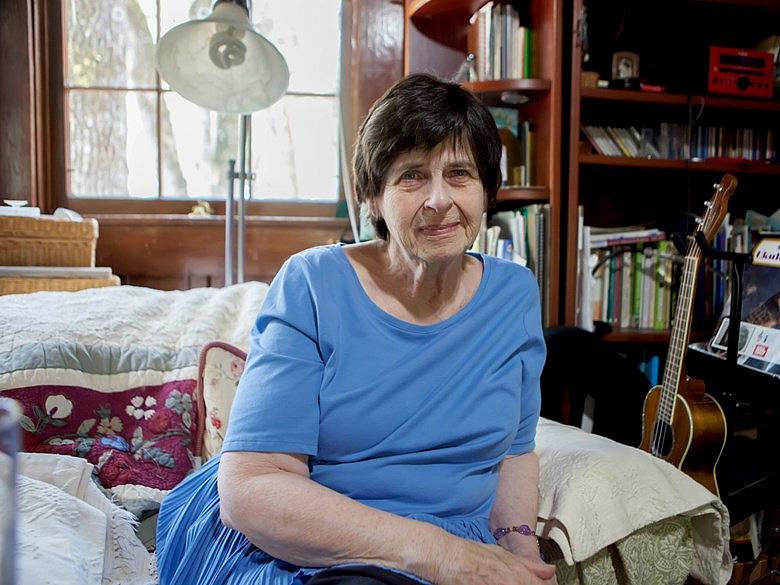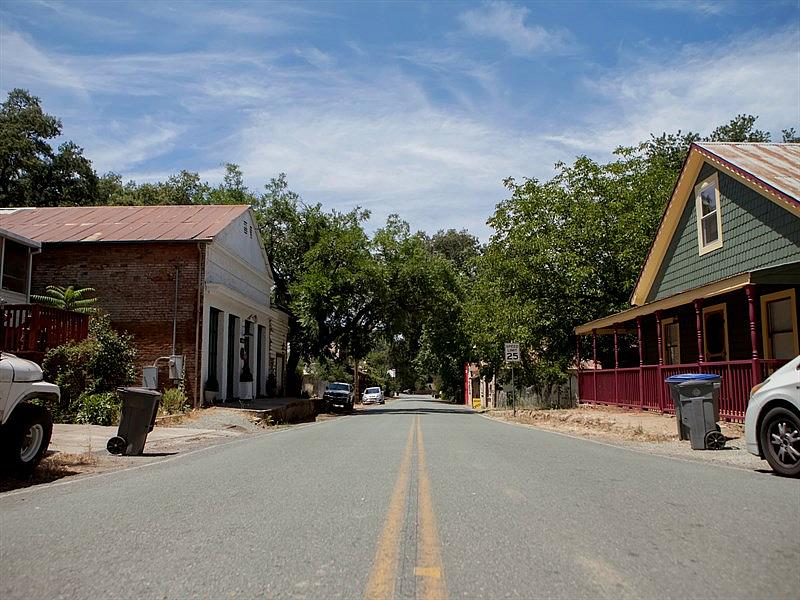Where are the psychiatrists? Amador County and rural California hit hardest by physician shortage
This story was produced as part of a project for the Dennis A. Hunt Fund for Health Journalism, a program of the USC Annenberg Center for Health Journalism.
Other stories in this series include:
Why Veterans Face Heightened Suicide Risk in Amador County and Other Rural Areas
CapRadio Healthcare Reporter Examines Rural Suicide In Amador County
Dying To Get Out: Stigma, ‘Copycat Effect’ Drive Youth Suicide In Rural Amador County
Chronic Loneliness Is A Major Cause Of Suicide For Seniors, Especially in Rural California
Q&A: How CapRadio Found Data On Suicides In Amador County
How Suicide Trainings, Community Connections Could Patch Holes In Amador’s Mental Health Safety Net
The ‘S’ Word: How Suicide Is Devastating Amador County And Rural Communities

Vanessa S. Nelson / Capital Public Radio
Heather Saxton lives alone in Fiddletown, a small community about 15 miles north of Jackson. Most days, she enjoys sitting quietly as the birds chirp outside her cottage. But sometimes her mind wanders to a darker place.
“It’s easy to dig oneself into being more and more lonely, because you start isolating and it sort of snowballs,” she said.
Like many residents of Amador County, Saxton lives far away from stores and restaurants, and also medical services. It’s a problem that plagues rural communities throughout California, and is likely a contributor to high suicide rates in these areas.
She was able to find mental health care to help with her depression, but her psychiatrist is in Folsom and her therapist is in Cameron Park. Each is about a 45 minute drive. Saxton said the windy roads in between make her nervous.
“I’m very reliant on telephone contact with both of them, because it’s not always possible to get [there],” she said.
Amador County has the state’s third-highest suicide rate, according to the latest rankings from the California Department of Public Health. Data from the county public health department shows that suicide claimed 85 lives in Amador from 2010 to 2017. Nearly 90 percent of people who killed themselves were men. More than a quarter were veterans, a handful were inmates. More than half used a gun.
Over the next month, Capital Public Radio will be publishing digital and radio stories that look at who is at greatest risk for suicide and what can be done to prevent these deaths. A complaint voiced by many in the community: the lack of mental health professionals.
Insurance coverage for mental health services expanded under the Affordable Care Act, but it hasn’t translated to more people getting care. That’s because the supply of providers isn’t keeping up with demand.
A recent report from UC San Francisco found that only about 37 percent of adults with mental illness actually received treatment in the past year.
It’s likely worse in rural counties, where substance abuse, financial stress and isolation contributes to depression. And stigma around mental illness keeps many from seeking help. (We’ll dig more deeply into those factors in our upcoming radio story.)
For people who can’t drive, it’s an even greater challenge. Locals said there’s only one psychiatrist in Amador. She’s in the county behavioral health department, but it took more than year to hire someone, even though the offered salary continually increased.
Due to Amador County’s mental health workforce shortage, residents here drive many miles on windy roads to seek care in Sacramento, Placerville or the Bay Area.
Dr. Bob Hartmann, a former Amador County public health officer and an internal medicine physician at Sutter Amador Hospital, said it’s been an ongoing struggle to recruit medical professionals.
“We just can’t convince young health care professionals that this is a good place to be,” he said. “It’s very, very difficult. We just seem to be very deficient.”
The new county psychiatrist only fills some of the gap; her department serves people on Medi-Cal. Patients with Medicare, Veterans Affairs plans and private insurance must seek help elsewhere.
Many just end up going to the hospital, where Nancy Leland directs emergency services. She said she sees someone in suicidal crisis once or twice a week.
Emergency department staff have some crisis training — but they have to shift into a whole different gear when they’re dealing with someone who is trying to kill themselves.
“It’s sort of a hyper-awareness,” Leland said. “You really have to be diligent in keeping track of the patient, meeting their safety needs. That’s the hardest part about it. Where there’s a will, there’s a way sometimes.”
They’ve turned to a solution that’s being used in rural communities across California: telepsych.
This is essentially a video conference between a patient and a far-away mental health professional. It also gives psychiatrists and emergency-department physicians a chance to create a medication plan.
“We think it’s wonderful,” Leland said. “We’re beginning to use it more, staff are getting more used to it, we’ve had some success.”
Hospital staff can also call the county’s mobile support team, which consists of one clinician and a peer support person. They travel to people in suicidal crisis when they get a call from a hospital, law enforcement, a friend or family member or passersby. After they de-escalate the situation, they try to find ongoing mental health care for the person experiencing suicidal thoughts.
There is currently no facility in Amador County for patients in acute mental crisis. Leland said some of these patients are in emergency room beds for as long as seven days before they find a psychiatric placement in Sacramento, Placerville or the Bay Area.
“Our concern is physical space,” she said. “That’s the biggest issue that we have.”
The lack of local services is just another deterrent that keeps people from seeking help, said Tammie Crabtree. She runs an Amador County nonprofit called Operation Care, a help center for victims of domestic abuse. But she said staff there field a lot of calls from people in mental health crisis.
There’s already a stigma around mental health in this area. People don’t want to talk about it for fear they’ll be seen as weak, or called “crazy.” Knowing they’ll have to go elsewhere for services makes them even more reluctant.
“People are afraid. They don’t want to leave where they feel safe,” Crabtree said. “So, sometimes it’s hard to get them to go where the resources are.”
Some counties are exploring smartphone apps and online chat therapy as a way to serve the large mental health case load. But in Amador, where many residents live without reliable cell and internet service, leaders are looking instead to expand social services and peer support networks. Neither provides the advanced level of care that many people in crisis need.
The behavioral health department and the Amador Community College Foundation recently teamed up to launch a distance learning center with high-speed internet where students interested in the mental health field can take online courses. They’re offering scholarships for local residents who want to earn a mental health technician certificate in hopes of creating a homegrown workforce.
But unless there’s major growth in the medical professional pipeline, long drives to appointments will remain a fact of life.
If you or someone you know needs help, call the National Suicide Prevention Lifeline at 1-800-273-8255. You can find additional resources, including programs for youth, seniors, veterans and Native Americans, here.
Correction: This story was edited to clarify that the 85 deaths by suicide in Amador County occured from 2010 to 2017.
[This story was originally published by Capital Public Radio.]

